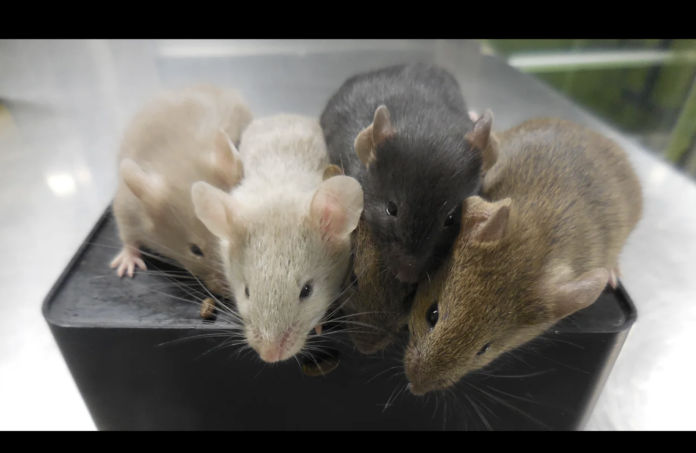Scientists have created mice with two biologically male parents for the first time — a significant milestone in reproductive biology.
The team, led by Katsuhiko Hayashi, a professor of genome biology at Osaka University in Japan, generated eggs from the skin cells of male mice that, when implanted in female mice, went on to produce healthy pups, according to research published March 15 in the peer-reviewed journal Nature.
100,000 newborn babies will have their genomes sequenced in the UK. It could have big implications for child medicine
The proof-of-concept research, the culmination of years of pain-staking lab work, could expand the possibilities for future fertility treatments, including for same-sex couples, and perhaps help prevent the extinction of endangered animals.
However, scientists warn there’s still much to learn before cultured cells can be used to make human eggs in a lab dish.
“It is expected that application into humans takes a long time, maybe 10 years or more. Even if it is applied, we never know whether the eggs are safe enough to produce (a) baby,” Hayashi said.
Skin cells reprogrammed from mice tails
The researchers took skin cells from the tails of fully grown male lab mice, which, as in male humans, contain one X and one Y chromosome, and turned them into induced pluripotent stem cells, or iPSCs — a type of cell that scientists have reprogrammed into an embryonic state.
This process of genetic engineering, which introduces specific genes to create cells that mimic embryonic stem cells, was pioneered by Nobel Prize-winning scientist Shinya Yamanaka.
(Induced pluripotent stem cells, which can be developed into any kind of human cell, are widely used in biological research to model and investigate human diseases and develop drugs.)
When the iPSCs are cultured in the lab, a few spontaneously lose the Y chromosome, which isn’t essential for the growth of this particular type of cell, generating “XO” cells, Hayashi explained.
The technology could help expand future possibilities for fertility treatment.
The researchers cultured the XO cells and found that some cells developed two X chromosomes as a result of cell division errors — making them chromosomally female. Treating the XO cells with a compound called reversine increased the number of XX cells, the researchers found.
From there, the team converted the XX cells into primordial germ cells, the precursors of eggs and sperm, that were subsequently programmed with the signals to turn them into egg cells. Once fertilized with sperm and implanted into a mouse uterus, the eggs generated live offspring.
“This study is particularly neat because it takes advantage of errors that are known to occur during culture of XY cells, which lead to loss of the Y chromosome and subsequent gain of a second X chromosome, resulting in XX cells that are capable of generating live offspring,” said Rod Mitchell, a professor of developmental endocrinology at the MRC Centre for Reproductive Health at the University of Edinburgh in Scotland, in a statement. He wasn’t involved in the research.
“However, its potential application for humans (e.g. for same-sex couples) remains to be seen. In the mouse study, very few of the embryos generated using mouse cells resulted in live offspring and the final steps required to convert germ cells into eggs have not been reliably reproduced using human cells,” added Mitchell, who is also a consultant pediatric endocrinologist at the Royal Hospital for Children and Young People in Edinburgh.
Only 7 out of 630 implanted mouse embryos gave rise to mouse pups. Hayashi said this low success rate — around 1% — wasn’t down to the process of sex chromosome conversion but the reality that cells cultured in a lab are typically inferior to those in a living animal.
“This is due to the suboptimal condition of the culture system. Especially, if the culture period is long (in this case 5-6 weeks), then the cell potential is compromised,” Hayashi said via email.
What’s next?
Hayashi’s research has raised the possibility that someday same-sex couples may be able to have a baby who shares both parents’ genes.
How human gene editing is moving on after the CRISPR baby scandal
“It (will be) difficult to produce babies from male-male (human) couples because of both technical and ethical reasons,” Hayashi said. “But it is theoretically possible to produce babies from male-male couples, as shown in this study.”
He said that it would be more challenging to accomplish the reverse — that is, making sperm from female cells because they contain no Y chromosome, which is essential for making sperm. Duplicating an X chromosome, which male cells already have, is easier than conjuring up a Y chromosome in female cells, Hayashi explained.
Glenn Cohen, the James A. Attwood and Leslie Williams Professor of Law at Harvard Law School, said the work raised thorny ethical and legal questions that society needed to start thinking about.
The technology could help the northern white rhino from going extinct. Najin (foreground), 30, and daughter Fatu, 19, are the last two of their kind on the planet.
These issues include embryo farming — producing hundreds of embryos to pick the best one — and the unauthorized use of a person’s cells.
“What happens to all the embryos created but not used? Does it violate ethical norms of respect to create so many potential human lives knowing that the vast majority will be destroyed or indefinitely stored?” said Cohen, who is also the faculty director of Harvard Law’s Petrie-Flom Center for Health Law Policy, Biotechnology & Bioethics.
“In the most extreme case, imagine an individual using sloughed skin cells left on a bathtub by Brad Pitt, for example, to derive sperm or egg in order to reproduce,” he added.
Saving animals from extinction?
The technique holds promise for conserving endangered species, although it’s not known whether the process in mice that resulted in the spontaneous loss of a Y chromosome and the duplication of the X chromosome would occur in other mammal species, said Mike McGrew, Personal Chair of Avian Reproductive Technologies at The Roslin Institute at the University of Edinburgh.
“This is a very exciting finding for species conservation,” he said via email. “You could imagine that the many ‘biobanks’ that are being established to capture genetic diversity stored for endangered species of animals. By chance, only or predominantly male cells may be conserved for some species.”
There are 2 northern white rhinos left worldwide. Scientists created embryos to save the animal from extinction
The techniques developed by Hayashi could help the northern white rhino breeding program, said Thomas Hildebrandt, professor and chair of wildlife reproduction medicine at Freie Universität Berlin and head of reproduction management at the Leibniz Institute for Zoo and Wildlife Research.
Only two animals of the species remain in the world, and both are female, Hildebrandt is attempting to artificially breed the animals with sperm and tissue samples taken from now deceased male counterparts.
“It’s a technology for tomorrow but we have an option to create a genetically sound population. This is only possible with this stem cell approach,” Hildebrandt said.
Make a donation to help support ABN, via PayPal: [email protected]. Follow Antigua Breaking News on Twitter @ABNAntigua and Instgram @AntiguaBreakingNews and on Facebook. Send us a message on WhatsApp at 1-868-704-9864 or email us at [email protected].
CLICK HERE TO JOIN OUR WHATSAPP GROUP FOR NEWS UPDATES. CLICK HERE TO JOIN OUR WHATSAPP GROUP FOR NEWS UPDATES. CLICK HERE TO JOIN OUR WHATSAPP GROUP FOR NEWS UPDATES. CLICK HERE TO JOIN OUR WHATSAPP GROUP FOR NEWS UPDATES. CLICK HERE TO JOIN OUR WHATSAPP GROUP FOR NEWS UPDATES.
CLICK HERE TO JOIN OUR WHATSAPP GROUP FOR NEWS UPDATES. CLICK HERE TO JOIN OUR WHATSAPP GROUP FOR NEWS UPDATES. CLICK HERE TO JOIN OUR WHATSAPP GROUP FOR NEWS UPDATES. CLICK HERE TO JOIN OUR WHATSAPP GROUP FOR NEWS UPDATES. CLICK HERE TO JOIN OUR WHATSAPP GROUP FOR NEWS UPDATES.
CLICK HERE TO JOIN OUR WHATSAPP GROUP FOR NEWS UPDATES. CLICK HERE TO JOIN OUR WHATSAPP GROUP FOR NEWS UPDATES. CLICK HERE TO JOIN OUR WHATSAPP GROUP FOR NEWS UPDATES. CLICK HERE TO JOIN OUR WHATSAPP GROUP FOR NEWS UPDATES. CLICK HERE TO JOIN OUR WHATSAPP GROUP FOR NEWS UPDATES.
CLICK HERE TO JOIN OUR WHATSAPP GROUP FOR NEWS UPDATES. CLICK HERE TO JOIN OUR WHATSAPP GROUP FOR NEWS UPDATES. CLICK HERE TO JOIN OUR WHATSAPP GROUP FOR NEWS UPDATES. CLICK HERE TO JOIN OUR WHATSAPP GROUP FOR NEWS UPDATES. CLICK HERE TO JOIN OUR WHATSAPP GROUP FOR NEWS UPDATES.
CLICK HERE TO JOIN OUR WHATSAPP GROUP FOR NEWS UPDATES. CLICK HERE TO JOIN OUR WHATSAPP GROUP FOR NEWS UPDATES. CLICK HERE TO JOIN OUR WHATSAPP GROUP FOR NEWS UPDATES. CLICK HERE TO JOIN OUR WHATSAPP GROUP FOR NEWS UPDATES. CLICK HERE TO JOIN OUR WHATSAPP GROUP FOR NEWS UPDATES.
CLICK HERE TO JOIN OUR WHATSAPP GROUP FOR NEWS UPDATES. CLICK HERE TO JOIN OUR WHATSAPP GROUP FOR NEWS UPDATES. CLICK HERE TO JOIN OUR WHATSAPP GROUP FOR NEWS UPDATES. CLICK HERE TO JOIN OUR WHATSAPP GROUP FOR NEWS UPDATES. CLICK HERE TO JOIN OUR WHATSAPP GROUP FOR NEWS UPDATES.
CLICK HERE TO JOIN OUR WHATSAPP GROUP FOR NEWS UPDATES. CLICK HERE TO JOIN OUR WHATSAPP GROUP FOR NEWS UPDATES. CLICK HERE TO JOIN OUR WHATSAPP GROUP FOR NEWS UPDATES. CLICK HERE TO JOIN OUR WHATSAPP GROUP FOR NEWS UPDATES. CLICK HERE TO JOIN OUR WHATSAPP GROUP FOR NEWS UPDATES.
CLICK HERE TO JOIN OUR WHATSAPP GROUP FOR NEWS UPDATES. CLICK HERE TO JOIN OUR WHATSAPP GROUP FOR NEWS UPDATES. CLICK HERE TO JOIN OUR WHATSAPP GROUP FOR NEWS UPDATES. CLICK HERE TO JOIN OUR WHATSAPP GROUP FOR NEWS UPDATES. CLICK HERE TO JOIN OUR WHATSAPP GROUP FOR NEWS UPDATES.
CLICK HERE TO JOIN OUR WHATSAPP GROUP FOR NEWS UPDATES. CLICK HERE TO JOIN OUR WHATSAPP GROUP FOR NEWS UPDATES. CLICK HERE TO JOIN OUR WHATSAPP GROUP FOR NEWS UPDATES. CLICK HERE TO JOIN OUR WHATSAPP GROUP FOR NEWS UPDATES. CLICK HERE TO JOIN OUR WHATSAPP GROUP FOR NEWS UPDATES.
CLICK HERE TO JOIN OUR WHATSAPP GROUP FOR NEWS UPDATES. CLICK HERE TO JOIN OUR WHATSAPP GROUP FOR NEWS UPDATES. CLICK HERE TO JOIN OUR WHATSAPP GROUP FOR NEWS UPDATES. CLICK HERE TO JOIN OUR WHATSAPP GROUP FOR NEWS UPDATES. CLICK HERE TO JOIN OUR WHATSAPP GROUP FOR NEWS UPDATES.




















